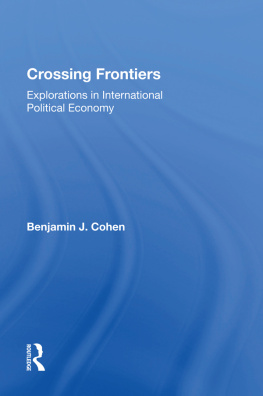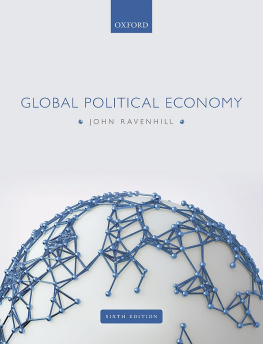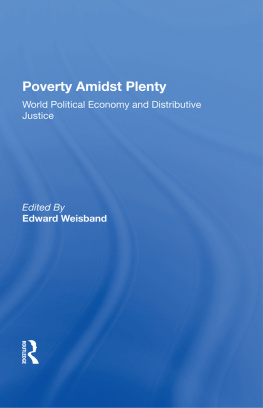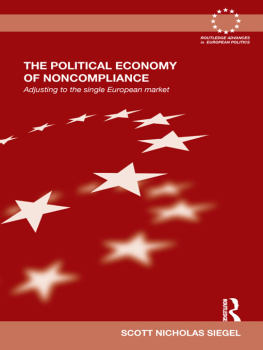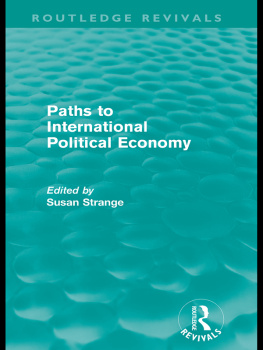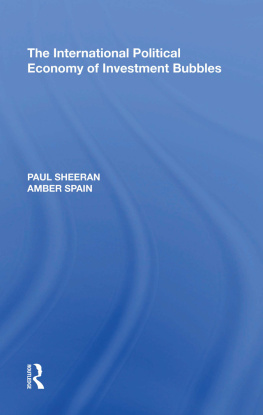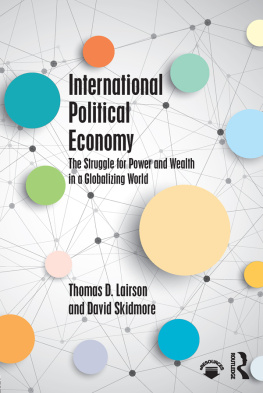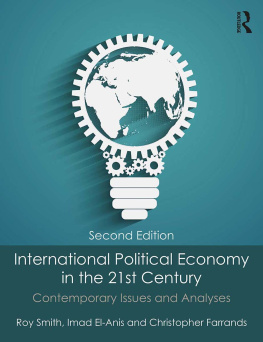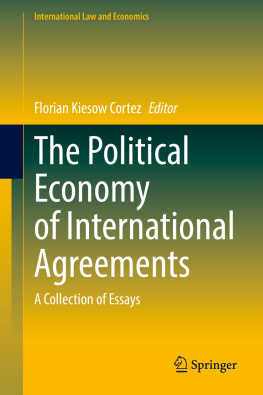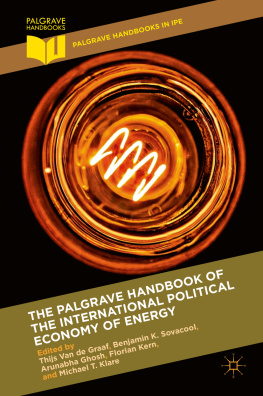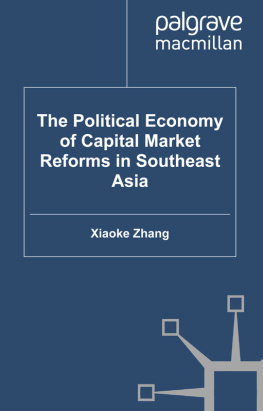First published in 1991 by Westview Press
Published in 2021 by Routledge
605 Third Avenue, New York, NY 10017
2 Park Square, Milton Park, Abingdon, Oxon OX14 4RN
Routledge is an imprint of the Taylor & Francis Group, an informa business
Copyright 1991 by Taylor & Francis
All rights reserved. No part of this book may be reprinted or reproduced or utilised in any form or by any electronic, mechanical, or other means, now known or hereafter invented, including photocopying and recording, or in any information storage or retrieval system, without permission in writing from the publishers.
Notice:
Product or corporate names may be trademarks or registered trademarks, and are used only for identification and explanation without intent to infringe.
Library of Congress Cataloging-in-Publication Data
Cohen, Benjamin J.
Crossing frontiers : explorations in international political
economy / Benjamin J. Cohen.
p. cm.(The Political economy of global interdependence)
ISBN 0-8133-7990-3
1. International economic relations. 2. United StatesForeign
economic relations. 3. United StatesEconomic policy. 4. United
StatesMonetary policy. 5. European Economic Community countries
Foreign economic relations. I. Title. II. Series.
HF1359.C64 1991
337.73dc20
90-43899
CIP
ISBN 13: 978-0-3670-1559-6 (hbk)
ISBN 13: 978-0-3671-6546-8 (pbk)
DOI: 10.4324/9780429045455
DOI: 10.4324/9780429045455-1
Frontiers, every beginning student of economics is taught, are the distinguishing characteristic. of international economic relations. In most respects markets are the same whether they are local or global: trade and investment, wherever they occur, may be assumed to be responsive to the same underlying constraints and incentives and to reflect the same basic motivations and goals. There is only one significant difference when economic activity goes internationalthe existence of political frontiers separating sovereign nation-states from one another. But what a difference that is! Separate states imply separate policies, and separate national policies imply a range of influences on outcomes that are not only additional to but also quite distinct from those prevailing in purely domestic markets. A quarter of a century ago, when I first embarked on a career of academic scholarship following completion of my graduate training in economics, I had no doubt that my special interest lay in the realm of transactions that cross frontiers.
One frontier, however, at the time seemed insuperablenot a frontier between states, but rather a frontier between disciplines. Back in the 1960s, in the English-speaking world at least, little systematic communication existed between the disciplines of economics and political science, particularly in the area of my chosen specialty of international economic relations. Formal analysis of the political dimension of the world economy tended to be avoided by economists; the economic dimension of world politics, conversely, was largely discounted by political scientists. The result was a cognitive barrier between the two professions that appeared virtually unbridgeable. Exceptions could always be found, of course, but mostly among marxist commentators or others outside the mainstream of conventional Western scholarship. Within the intellectual mainstream, few challenged or even questioned the disciplinary tunnel vision that had tended to characterize the social sciences since the divorce of political science from economics in the latter half of the nineteenth century. Academic astigmatism, Susan Strange called it in 1971.[]
In the years since, all that has changed. Today the study of International Political Economy (IPE) has become a recognized and respected research specialty in Western academic circles, complete with a formal scholarly literature that has grown by leaps and bounds since the first scattered seeds were sown in the late 1960s and early 1970s. Some of the earliest contributions were made by economists, including most notably Richard Cooper,[] Robert Gilpin,[7] Stephen Krasner,[8] and Peter Katzenstein,[9] and continuing thereafter with an ever widening cadre of adventurous scholars and students. Only a relatively few economists have continued to labor in this particular vineyard, overcoming the disinclination of their increasingly mathematically oriented profession to take on messy questions of politics and power. With some pride I include myself among the small number of economists who, despite the difficulties inherent in cross-disciplinary work, have persisted in attempting to add their insights to the development of the IPE field.
Almost from the start of my academic career, I found myself drawn to exploring theoretical and policy issues at the frontier between the specialties of international economics and world politics. Topics that I have addressed, at one time or another, encompass some of the most central themes of the contemporary literature on International Political Economyin particular, the relationship between commercial and political interests in the conduct of foreign policy, the origins of economic imperialism, the organization of international monetary and financial relations, and the evolving nature of foreign economic policymaking in the United States and Europe. The purpose of this volume is to bring together in one location a representative sample of my diverse efforts to advance analysis of each of these themes written over a span of more than two decades. Since, happily, most of the dozen essays in this collection seem to have with stood the test of time reasonably well, all are reprinted essentially as they originally appeared with only minor extraneous material excised in a few cases. Together they provide an easily accessible, and, I hope, illuminating introduction to what much of IPE today is all about.
Methodological Themes
International Political Economy has been usefully defined by Gilpin as the reciprocal and dynamic interaction in international relations in the pursuit of wealth and the pursuit of power.[10] The hallmark of IPE as a distinctive area of scholarly inquiry is its emphasis on the formal integration of market and political analyses in the realm of international affairs. It is not merely a matter of studying the autonomous role of politics in setting the framework for economic activity. across national frontiers, which tends to be the approach of conventional economics. Nor is it solely a question of the independent role that international markets may play in affecting the attainment of political goals, which has always been the typical approach of political science. In IPE, both economics and politics are treated as endogenous variables (determined by systematic process) rather than as exogenous parameters (given by arbitrary assumption). And central attention is paid to the key role played by governments, since the fundamental unit of authority in the international system still remains the sovereign state. The core issues of the field are considered to be questions of public policy.

